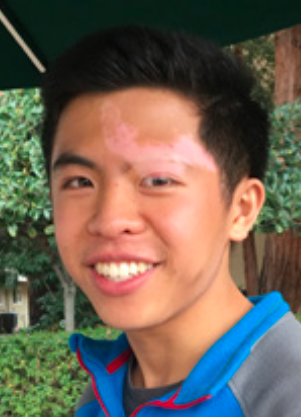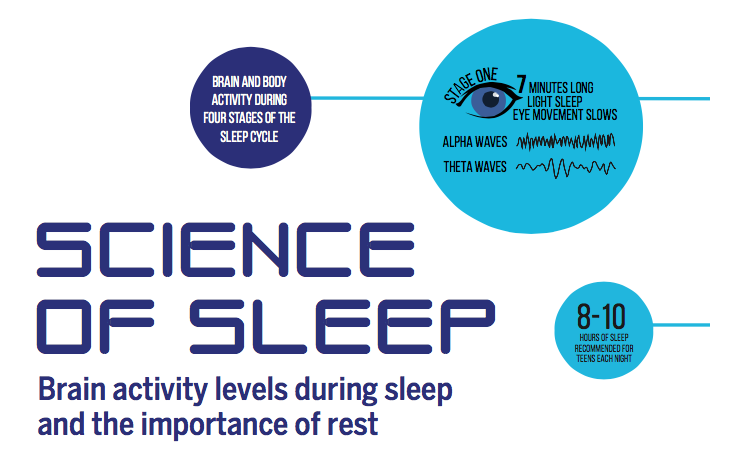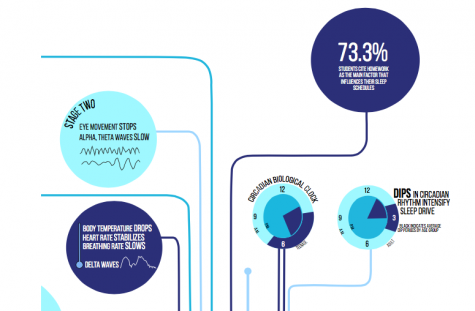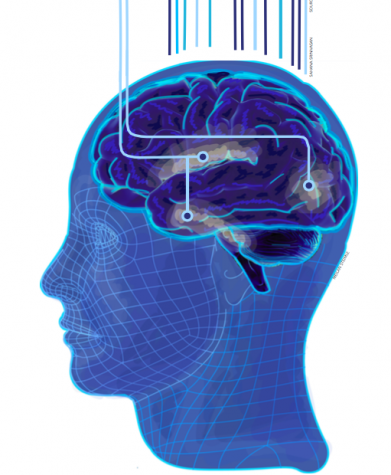Science of Sleep: Brain activity levels during sleep and the importance of rest
March 28, 2017
It’s midnight and you’re staring down at your math homework through the usual haze of fatigue. You need to get started on your history project, but the wonderful world of YouTube holds so much promise of entertainment and happiness. You sigh in resignation and click on a thumbnail, telling yourself that you’ll begin writing your English essay soon—and now it’s 3:30 a.m., and you’re finally crawling into bed exhausted and drained.
A critical component of human life, sleep takes up one-third of the average human’s lifespan. Sleep is a state of altered unconsciousness that mammalian life goes into and out of on a regular basis, on the rhythm of the circadian cycle. Heavily regulated by the amount of light that can come in or out of your eyes, the process of sleep homeostasis ensures that humans receive signals of sleepiness when sleep is needed.
“Circadian rhythms are incredibly important for helping people fall asleep at the right time and get up at the right time,” Dr. Jamie Zeitzer, assistant professor of psychiatry and behavioral sciences at Stanford, said. “Light is the most important thing that you can control out of the factors that influence your circadian rhythm.”

“In REM [sleep], the body is more or less paralyzed. This is protective so that you do not act out dreams- while many have had the experience of feeling para- lyzed during a dream, this is probably due to partial awareness of paralysis.”
— Dr. Carl Bazil, Professor of Neurology at Columbia University Medical Center
Sleep consists of five stages, four of which are in the non-rapid eye movement (NREM) stage and one of which is in the rapid eye movement (REM) stage. This pattern repeats itself approximately every 90 minutes throughout one’s period of sleep.
Stage one, often referred to as “light sleep,” is the time during which a person switches between being awake and being asleep. The body moves the most during this stage than in any other stage. While one can dream during stage one, their dreams are not as complete and vivid as the ones they may experience during REM sleep.
During stages two, three and four, one’s breathing and heart rate regularize and steady, and body temperature begins to drop. Breathing also becomes slower as the body’s parasympathetic nervous system, the part of the nervous system that regulates one’s psychological responses to situations of rest and recuperation, is incited and the sympathetic nervous system, the part of the nervous system that activates when undergoing stress, is suppressed.
REM sleep occurs during stage five, when the brain is more active and produces brain waves similar to those seen in awake individuals. Breathing also becomes more rapid and irregular, and both heart rate and blood pressure increase to near-waking levels. While REM periods are shorter near the beginning of sleep, they increase in duration as sleep progresses.
“In REM, the body is more or less paralyzed. This is protective so that you do not act out dreams- while many have had the experience of feeling paralyzed during a dream, this is probably due to partial awareness of paralysis,” Dr. Carl Bazil, professor of neurology at the Columbia University Medical Center, said. “We know that rats replay some things they have learned during REM sleep, leading to the theory that REM may be important for some aspects of memory as well.”
According to the American Sleep Association, 37 percent of young adults report suffering from sleep deprivation. 37.9 percent of adults have reported unintentionally falling asleep during the day in the past month. Sleep disorders are prevalent in the United States, with over 50 million adults diagnosed with some sleep disorder and 25 million adults diagnosed specifically with obstructive sleep apnea.
The National Sleep Foundation states that teens need eight to ten hours of sleep every night. However, only around 10 percent of adolescents actually achieve the recommended amount during school days; as a result, students often resort to catching up on rest by sleeping in on the weekends.
“On average, I get around four to six hours of sleep on a school night. I literally just sleep so much on the weekends; I wake up at 12 p.m. or 1 p.m. sometimes,” Nikhil Dharmaraj (10) said. “My lack of sleep is probably attributed to the amount of homework I have. I do feel drowsy in the morning, but after that, the day goes on [as normal].”
An individual’s sleep cycle is greatly affected by the circadian rhythm, the biological clock which dictates the 24-hour cycle of biological processes for living organisms. It regulates activity including hormone production, cell regeneration and brain wave activity. Most people experience drowsiness between 1 and 3 p.m. due to circadian rhythms, according to the National Sleep Foundation.
Exposure to and the presence of light significantly impacts one’s sleep process. Light recognized by the retina in the eye triggers a nerve signal between the eye and the hypothalamus in the brain. This signal stimulates the release of hormones and other brain behavior that regulates feelings of sleepiness or waking.
According to a survey conducted by the Winged Post, 48.5% of the student body sleeps for 7 hours per night during weeknights. On weekend nights, 35.6% of the student body sleeps for 10 hours.
“There’s nothing wrong with going to sleep late; the problem is encountered when you have to get up early. The most obvious side effect that people experience is sleepiness,” Dr. Zeitzer said. “However, there are many other things that are going on as well; for example, athletic performance decreases, academic performance decreases and your social ability decreases, in the sense that you become more easily irritable.”
In an effort to improve students’ sleep health and relieve fatigue-related stress, student council and ASB instituted a sleep room policy last year, which asked teachers to offer up their classrooms during scheduled times as quiet resting places for students. However, the system was removed shortly after its launch due to a lack of student response and use.
While no similar measures have since been implemented, students and faculty alike can improve their sleep health through a variety of methods. As one’s circadian clock is controlled through his or her exposure to light, medical professionals recommend spending as much time outside during the day as possible to reduce drowsiness during the day and to increase the production of melatonin, a hormone that regulates sleep, during the night.
Reducing exposure to artificial light can also lessen its negative effects on the human body. A 2015 Harvard University study discovered that blue light, which is emitted by many digital devices, suppresses melatonin production. As teenagers naturally have a more delayed circadian rhythm, such distractions can further disrupt their sleep cycles.
“Studies have shown that even if teenagers have an electronic device in their bedroom but are not using it, just the presence of the device can affect sleep,” Kaiser Permanente pediatrician Dr. Karen Chiu said. “It’s because their minds are constantly on receiving notifications.”
To improve sleep hygiene, the National Sleep Foundation recommends practicing a relaxing bedtime ritual and sticking to a strict sleep schedule, even on the weekends. Both of these habits help regulate one’s circadian clock and help with falling asleep and staying asleep more easily.
For teenagers, some more specific methods towards bettering one’s sleep health include stopping the use of electronic devices one hour before bedtime to minimize the impact of artificial light on their circadian rhythm and taking short power naps during the early afternoon.
What helps you fall asleep at night?
Students share tips and tricks for falling asleep faster.

“If I don’t go on any technology, like my phone or
watch television 30 minutes before I go to bed [be-
cause] then I can usually fall asleep faster,” Aarzu Gupta (9) said.

“A really warm room and thinking about my tests the next day because it bores me so much that I fall asleep,” Ihita Mandal (10) said.

“Quiet, darkness and warmth,” Kai-Siang Ang (12) said.


